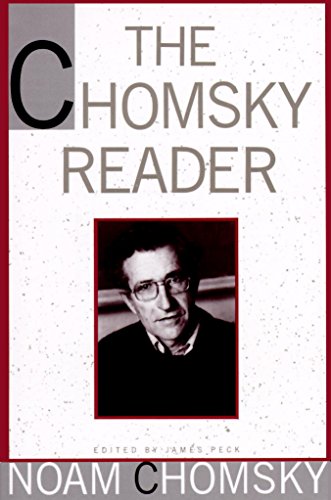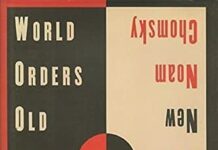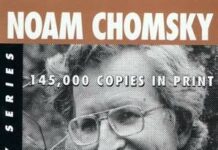
Ebook Info
- Published: 2010
- Number of pages: 499 pages
- Format: PDF
- File Size: 3.03 MB
- Authors: Noam Chomsky
Description
The Chomsky Reader brings together for the first time the political thought of American’s leading dissident intellectual—“arguably the most important intellectual alive” (The New York Times).At the center of practically every major debate over America’s role in the world, one finds Noam Chomsky’s ideas—sometimes attacked, sometimes studiously ignored, but always a powerful presence.Drawing from his published and unpublished work, The Chomsky Reader reveals the awesome range of this ever-critical mind—from global questions of war and peace to the most intricate questions of human intelligence, IQ, and creativity. It reveals the underlying radical coherency of his view of the world—from his enormously influential attacks on America’s role in Vietnam to his perspective on Nicaragua and Central America today. Chomsky’s challenge to accepted wisdom about Israel and the Palestinians has caused a furor in America, as have his trenchant essays on the real nature of terrorism in our age. No one has dissected more graphically the character of the Cold War consensus and the way it benefits the two superpowers, or argued more thoughtfully for a shared elitist ethos in liberalism and communism. No one has exposed more logically America’s acclaimed freedoms as masking irresponsible power and unjustified privilege, or argued quite so insistently that the “free press” is part of a stultifying conformity that pervades all aspects of American intellectual life.In a lengthy interview with the editor, Chomsky discussed his thought in the context of his personal history.
User’s Reviews
Reviews from Amazon users which were colected at the time this book was published on the website:
⭐It has been some years since I’ve read “The Chomsky Reader”. I’ve read most everything Noam Chomsky has written over the years. I find his intellect penetrating and his methodology nearly inimitable. This copy was purchased by me, not for me, but for a young, (20 year old) friend at work. I had it sent directly to him. I don’t know if anyone before has invested in his education in a similar way but I felt it an inexpensive effort to make him aware of something he might not find on his own. My own little “butterfly wing effect”. Perhaps there will be no significant result but I doubt it will hurt. Maybe we might all consider gifting those we encounter in our lives, who might be receptive, with those authors, we find perspicacious and right minded. Noam Chomsky is a tweak to the intellect to those who are willing to venture an attempt. I trust that is how my young friend will respond. Perhaps in some small way, he will interact with the world differently as a result of my intervention and just maybe, this world will be a bit kinder to my grandchildren as a result, just maybe.
⭐The problem with these essays is that some of them were written a long time ago. The essay on the Palestinians dates from 1983, so its copious detail is almost irrelevant to current conditions.This does not gainsay Chomsky’s originality and superiority as a thinker. There is no one like him.
⭐I hope you have plenty of necessary and emotionally powerful illusions to cling to my friend. Chomsky is a national treasure, whether one agrees with him or not. Where do they make people who can’t see that?
⭐There is no plot, this is a non-fiction book. Chomsky is a critic of our society, and is usually worth reading.
⭐Chomsky never asks you to take his word for it. He challenges existing beliefs and paradigms and refutes them, providing evidence of his assertions. You, as the reader, are invited to read what he writes, agree or disagree. Chomsky invites readers to question what information they are given and exercise simple reason and skepticism in evaluating that information.The introduction to this collection of essays (and informative interview) is excellent. It provides a basic overview of Chomsky’s philosophy (if you could call it that.) I felt that this book was basic reading, particularly for those who are new to Chomsky’s works. In the introduction Peck writes that freedom and the process of indoctrination go hand in hand… and in America freedoms exist “within an ideological consensus that limits debate and protects powerful interests in ways all too similar to those in which obviously repressive societies operate.” The entire book (and Chomsky’s many other works) provide evidence of these statements. Chomsky is meticulous in combing for details and wants readers to release themselves from the mindlessness of taking information (or veracity of readily available information) for granted. Conventional media are seemingly free from having a burden of proof and need not provide any evidence to support their claims. This is not only the fault of media outlets. The media do what they can get away with. Discriminating, thoughtful readers seeking information should not accept that.One of the most apt analogies Chomsky makes in the interview is that professional sports, as an example, are one means for deflecting attention from real and important issues. The layperson can argue and analyse football to death and feel comfortable making his/her own analysis of athletics. However, these same people see world affairs and politics as out of the realm of their experience and expertise and do not even attempt to learn about it. Naturally something is to be said for the fact that many Americans so not have interest in these affairs and are more interested in sports… but it is a cyclical and indoctrinated response. From a young age, Americans are indoctrinated to focus on what their favourite team is doing as opposed to what is happening in another part of the world.An interesting thought to ponder (at least for me), though, is that in reading the older essays, Chomsky discussed the lack of access to unbiased information. I wonder if this has changed or even been revolutionised by access to electronic publications and communication and technology in general? Or is this just wishful thinking?
⭐Dear Colleagues, Noam Chomsky understands the power of language, the nature of language, how language can be used and how language is frequently abused by those who would seek to lead us, influence us, beguile us, repress us or simply rip-us off for as long as possible.Noam Chomsky makes people think, he poises some of the difficult questions, and will maybe have you struggling to justify some of your best and long held beliefs in people and society. In this way, this book is both a gentle introduction and a great mental workout, if nothing else, and it can be much more.Starting with this book by Chomsky if you haven’t read any of his stuff before is like deciding on a diet and workout plan that is neither drastic or radical, but eases the reader into the Chomsky ways of seeing things, of gathering facts, of interpreting language and of developing ideas and analysis. Chomsky is nearly always delivering arguments that are mutually exclusive and collectively exhaustive, which leads for well focussed and sometimes overly-knowledge rich text, but it’s well worth the effort – in my book Chomsky is one of the greatest thinkers of the last 100 years – even if you, like me, will disagree with at least 50 percent of Chomsky’s conclusions.Regards,Martyn_jones@iniciativas.com
⭐Everything about Chomsky is nice , this book is very good …interviews and the chapter about Spanish civil war very interesting.
⭐Fascinating reading
Keywords
Free Download The Chomsky Reader in PDF format
The Chomsky Reader PDF Free Download
Download The Chomsky Reader 2010 PDF Free
The Chomsky Reader 2010 PDF Free Download
Download The Chomsky Reader PDF
Free Download Ebook The Chomsky Reader





